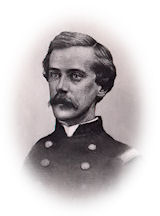 April 24th. This morning was destined to be recorded in history as the day on which occurred the most brilliant naval feat ever accomplished. It had been decided to run past the forts without stopping, and accordingly, at two o’clock A. M., all hands were quietly turned out, hammocks lashed, and everything put in order, while two red lights from our peak gave the signal for the squadron to get under way.
April 24th. This morning was destined to be recorded in history as the day on which occurred the most brilliant naval feat ever accomplished. It had been decided to run past the forts without stopping, and accordingly, at two o’clock A. M., all hands were quietly turned out, hammocks lashed, and everything put in order, while two red lights from our peak gave the signal for the squadron to get under way.
The squadron was divided into three divisions under the commands of Flag Officer Farragut, Capt. Bailey, and Capt. Bell. The night was pleasant and starlight, and as we moved away the morning moon came looming up from behind the trees. Twenty minutes brought us within range of the enemy’s guns, which were immediately opened upon us. Our men lay down on the decks till our guns could be brought to bear. The forts, mounting in the aggregate some two hundred and twenty guns, were soon in full blast upon us, and we returned the fire with decision and effect, making the action general and terrible. The forts, only three quarters of a mile apart, gave our ships shot and shell on both sides at once, while our ships sent back grape, canister, shrapnel, and shells, besides using our howitzers from our tops, where they had been mounted. On reaching the forts we were assailed by twenty of the enemy’s gunboats and rams, but we made short work of them, sinking some, and burning nearly all of them.
A shell entered our starboard beam, cutting off our cable passing through eighteen inches of oak, and after tearing the armory down, exploded at the main hatch, killing one man instantly, and severely wounding three or four others; another entered the muzzle of a gun, breaking the lip, which killed the sponger, who was in the act of ramming home a cartridge. At this time we ran aground, when the ram Manassas forced a fire raft against our port quarter for the purpose of destroying us, but owing to the superhumane fforts of the officers and crew it was cast off and sent floating down the river. Our mizzen rigging was burnt, and the ship considerably charred, but we providentially escaped, and in a few minutes got afloat by backing down towards the enemy’s forts, while they played away upon us beautifully.
After an hour and twenty minutes action we passed beyond reach of the rebel guns, and ceased firing. We came to our anchor at the quarantine grounds at about five o’clock, the river banks being lined on either side with burning steamers.
The ram Manassas had followed us up some distance, and now the old frigate Mississippi turned about to run her down, but the ram ran her nose into the mud, and the Mississippi in three broadsides crippled her, and she drifted down the river, while her crew escaped. One of our gunboats, the Varuna, after destroying five or six of the enemy’s steamers was herself sunk, and was run aground with some loss of life. Our loss was some thirty in killed and one hundred wounded. The enemy’s loss was five or six hundred, while their dead and wounded were burned in their steamers. Two of our gunboats were obliged to put back, one with a shot through her boilers, and the other disabled. Among the ships which passed the forts were the following: Flag ship Hartford, Brooklyn, Pensacola, Richmond, and the old frigate Mississippi, Iroquois, and Oneida. Gunboats Varuna, Wissahickon, Cayuga, Katadin, and Pinola. After taking prisoners from Camp Chalmette we started for New Orleans. White flags were waving in all directions, and as we proceeded the plantations and river banks presented a scene truly beautiful, being at a time of year when nature puts on her best attire. Some of the dwellings looked like castles, and bore evidence of age, being usually surrounded by large trees; each had attached its double row of negro dwellings, regularly laid out and interspersed with trees. We ran up near the English Turn, and anchored for the night unmolested.










